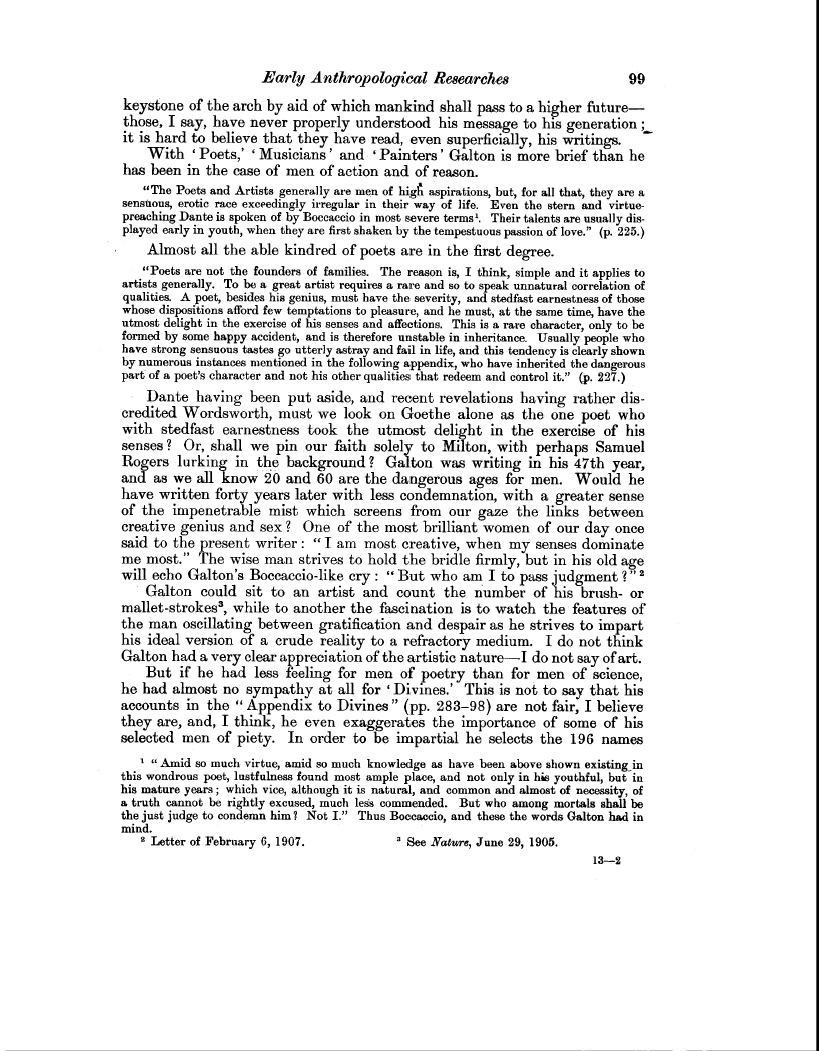Early Anthropological Researches 99 keystone of the arch by aid of which mankind shall pass to a higher futurethose, I say, have never properly understood his message to his generation;
~
it is hard to believe that they have read, even superficially, his writings.
With `Poets,' ` Musicians' and 'Painters' Galton is more brief than he has been in the case of men of action and of reason.
"The Poets and Artists generally are men of high aspirations, but, for all that, they are a sensuous, erotic race exceedingly irregular in their way of life. Even the stern and virtuepreaching Dante is spoken of by Boccaccio in most severe terms'. Their talents are usually displayed early in youth, when they are first shaken by the tempestuous passion of love." (p. 225.)
Almost all the able kindred of poets are in the first degree.
"Poets are not the founders of families. The reason is, I think, simple and it applies to artists generally. To be a great artist requires a rare and so to speak unnatural correlation of qualities. A poet, besides his genius, must have the severity, and stedfast earnestness of those whose dispositions afford few temptations to pleasure, and he must, at the same time, have the utmost delight in the exercise of his senses and affections. This is a rare character, only to be formed by some happy accident, and is therefore unstable in inheritance. Usually people who have strong sensuous tastes go utterly astray and fail in life, and this tendency is clearly shown by numerous instances mentioned in the following appendix, who have inherited the dangerous part of a poet's character and not his other qualities that redeem and control it." (p. 227.)
Dante having been put aside, and recent revelations having rather dis
credited Wordsworth, must we look on Goethe alone as the one poet who
with stedfast earnestness took the utmost delight in the exercise of his
senses? Or, shall we pin our faith solely to Milton, with perhaps Samuel
Rogers lurking in the background? Galton was writing in his 47th year,
and as we all know 20 and 60 are the dangerous ages for men. Would he
have written forty years later with less condemnation, with a greater sense
of the impenetrable mist which screens from our gaze the links between
creative genius and sex? One of the most brilliant women of our day once
said to the present writer : " I am most creative, when my senses dominate
me most." The wise man strives to hold the bridle firmly, but in his old age
will echo Galton's Boccaccio-like cry : " But who am I to pass judgment ? " 2
Galton could sit to an artist and count the number of his brush- or
mallet-strokes', while to another the fascination is to watch the features of
the man oscillating between gratification and despair as he strives to impart
his ideal version of a crude reality to a refractory medium. I do not think
Galton had a very clear appreciation of the artistic nature-I do not say of art.
But if he had less feeling for men of poetry than for men of science,
he had almost no sympathy at all for `Divines.' This is not to say that his
accounts in the "Appendix to Divines" (pp. 283-98) are not fair, I believe
they are, and, I think, he even exaggerates the importance of some of his
selected men of piety. In order to be impartial he selects the 196 names
1 "Amid so much virtue, amid so much knowledge as have been above shown existing_ in this wondrous poet, lustfulness found most ample place, and not only in his youthful, but in his mature years ; which vice, although it is natural, and common and almost of necessity, of a truth cannot be rightly excused, much less commended. But who among mortals shall be the just judge to condemn him? Not I." Thus Boccaccio, and these the words Galton had in mind.
2 Letter of February 6, 1907. 3 See Nature, June 29, 1905.
13-2

